|

Flucht nach Südamerika
Die Familie Jakob Alexander lebte bis zu ihrer Flucht aus Nazi-Deutschland in Gelsenkirchen. Das Ehepaar Jakob und Ella Alexander hatte zwei Söhne, die Zwillinge Kurt und Werner, die beiden besuchten das damalige Realgymnasium an der Adolf-Hitler-Sraße (Anm. d. Verf.: heutiges Grillo-Gymnasium), bis sie als Juden 1936 von dieser Schule vertreiben wurden. Jakob Alexander und seinem Bruder Friederich gehörte zu gleichen Teilen unter anderem das Kaufhaus Carsch&Co an der Gelsenkirchener Bahnhofstraße sowie weiterer umfangreicher Immobilien- und Grundbesitz. Im April 1939 gelang der Familie die Flucht nach Rio de Janeiro. Deborah Alexander, die Enkelin von Jakob Alexander, hat dem Gelsenzentrum e.V. jetzt einen mit Fotos aus Privatbesitz illustrierten Bericht zur Verfügung gestellt, in dem Sie die Geschichte Ihrer Familie schildert:
My name is Deborah Alexander. I live in Rio de Janeiro city, in Brazil. I would love to write to you in German, but unfortunately, I do not speak the language, at least for now. My native language is Portuguese, so I hope you don’t mind that I’m writing you in English.
I would like to congratulate you on the initiative to work towards preserving the memory of the local culture in order to act against forgetfulness. I totally agree with the need to bring awareness to society in order to contribute to a more tolerant and human future for all of us.
My father, Kurt Alexander, was born in Essen in 1919 and, like my grandparents, my great-grandparents and my great-great-great-grand-parents, he was German but he was also Jewish. My grandfather Jakob (or Julius) came from Werther and my grandmother Eliza (or Ella) came from Varel. From the birth of my father and his twin brother Werner until 1939, when they had to flee Germany, the whole family lived in Gelsenkirchen.
|
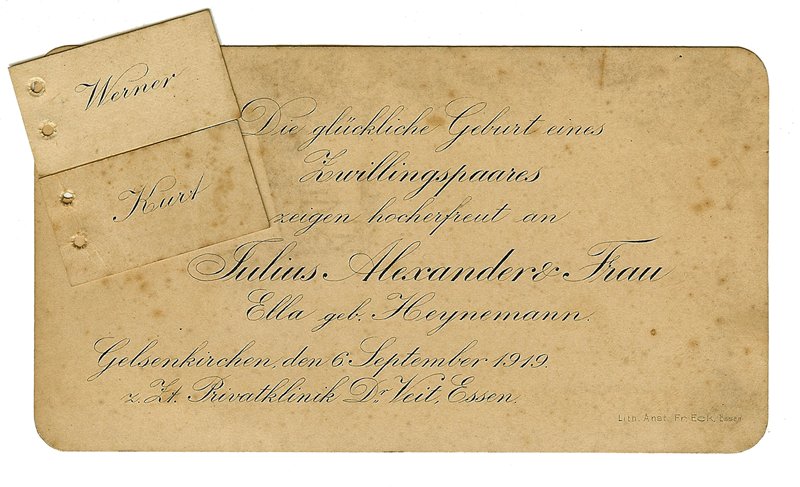
Birth announcement card of the twins Kurt and Werner.
|
|
My grandfather took a long time to accept the fact that he should leave his homeland behind. Jakob was proud to be German. After all, he had fought as a volunteer during the First World War including he was awarded the Honour Cross of the World War 1914/1918.
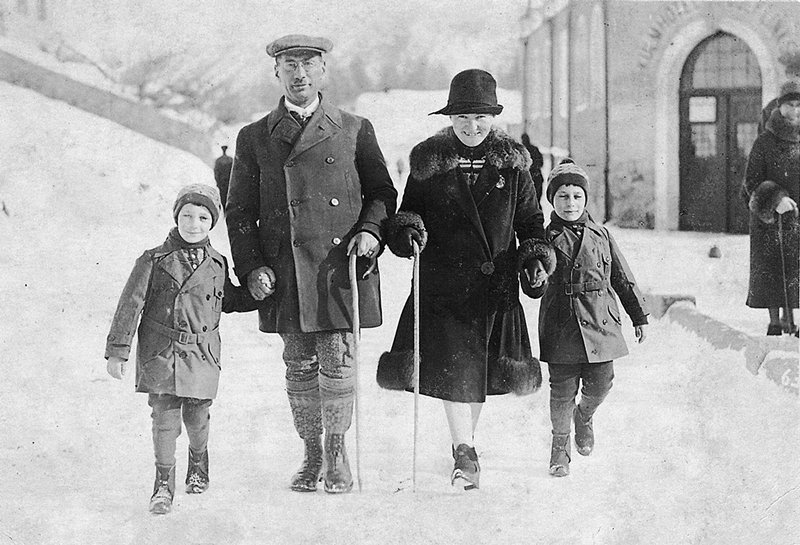
Jakob & Ella Alexander and the twins Werner & Kurt
However, as it is known, the persecution of Jews got worse and what happened in the “Kristallnacht” removed any doubts the family might have had about the seriousness of the situation. Like happened all over the country with Jewish men, various members of the Alexander family were arrested. My father was also imprisoned in a concentration camp for about a month.
During his life, he told me very little about his life in Germany because I think he had mixed feelings about his homeland memoirs. However, my father did keep a number of family photographs, letters and documents during all his life. Nowadays, it is this collection inherited from him that let me find out things I’ve never known about his history.
|
|
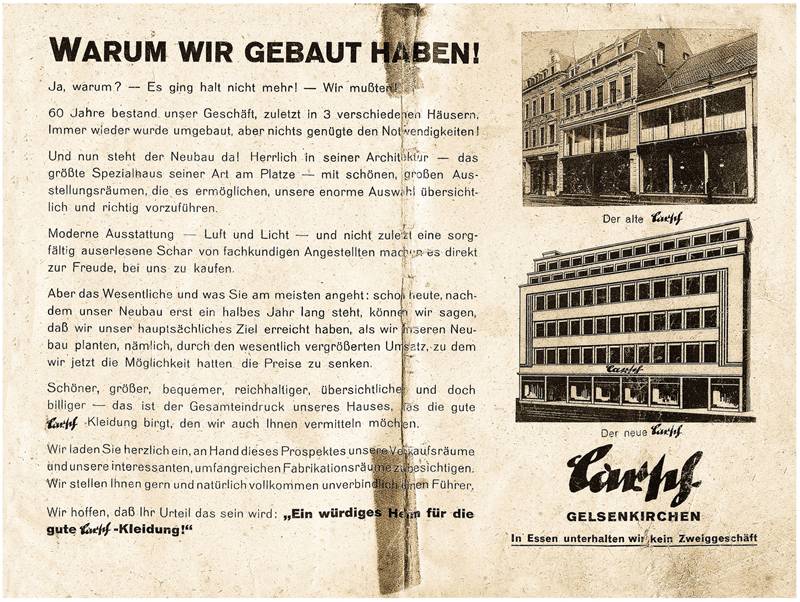
Page of a brochure from Carsch Store
Now I know that Sofie and Moses were my great-grandparents, parents of Jakob and his siblings Alex, Hugo, Arnold, Friedrich, Lina, Johanna and Julie, who died during her childhood. All of the eight children were born in Werther between 1875 and 1888. However, Gelsenkirchen was the place where the majority of the family chose to live since the 20s. Lina and Johanna were unmarried while all of the other brothers had built their own families. Hugo was a doctor and the other siblings worked all together in a wealthy business, a store called Carsch, which had a branch in Essen.
|
|
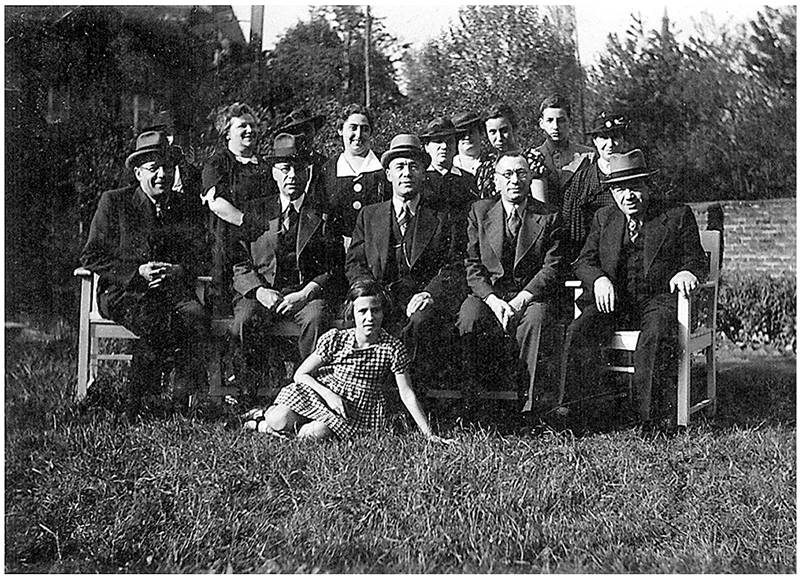
The Alexander family in Gelsenkirchen, May 1936. Back row: Ella (Jakob’s wife), Meta (Friedrich’s wife), Adele (Alex’s wife), Leni (Hugo’s wife), Lina, Erna (Arnold’s wife), Hannelore (Alex’s daughter), Hans (Friedrich’s son), Johanna. Front row: The brothers Friedrich, Hugo, Alex, Jakob and Arnold. Seated on the floor: Inge (Alex’s daughter)
|
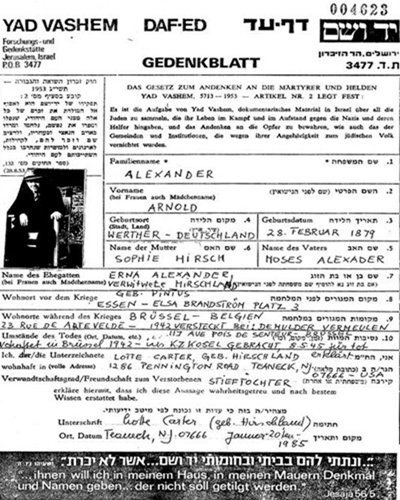
Page of testimony sent by Lotte Carter from the Central Database of Shoah Victims’ Names of Yad Vashem
The children of Moses and Sofie were closer to each other. They lived an unostentatious lifestyle. They shared everything they had. Unfortunately, as a result of the Nazi regime, the family were scattered around the world. Lina died while still in Gelsenkirchen on March 02, 1939. Jakob, Friedrich and Johanna came to Brazil. Hugo and Alex, who initially went to England, ended up in the United States. The four brothers left with their own families, Johanna was still single.
Unfortunately, Arnold was not as lucky as his siblings. During the war, he was in Brussels, Belgium, when he was arrested and sent to Kazerne Dossin. From there, Arnold was deported to Auschwitz on October 10, 1942. He perished in Kosel, in Upper Silesia, at the age of 66. I am always moved whenever I see the page of testimony sent by his stepdaughter Lotte to Yad Vashem.
|
|
|
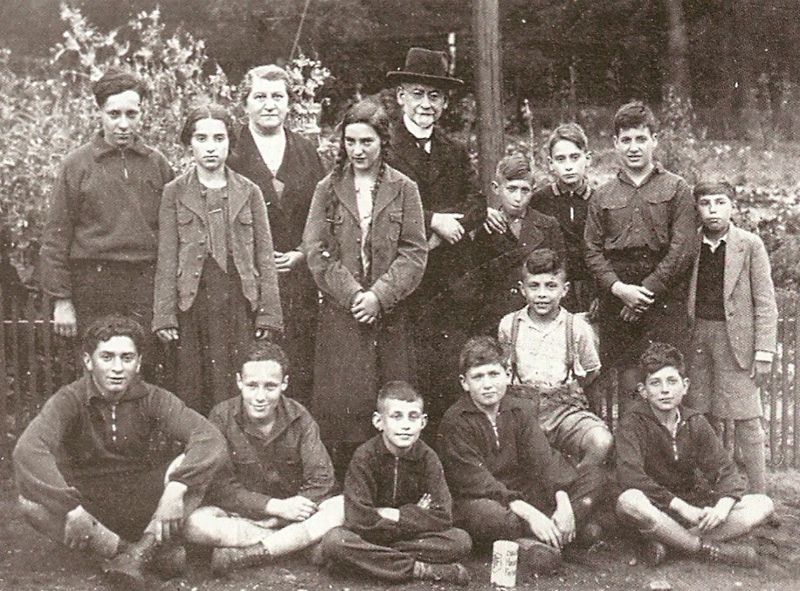
Rabbi Dr. Siegfried Galliner with a students group. Werner is the twin who is standing left, Kurt is the one who is sitting, the second student from left to right. Hans Alexander is the second one who is standing from right to left. (Source: ISG, 11092)
On April 5, 1939, my grandfather and his family arrived in Rio de Janeiro city. In his luggage, he brought a letter of reference written by Rabbi Galliner, the same Rabbi in the picture with the students group.
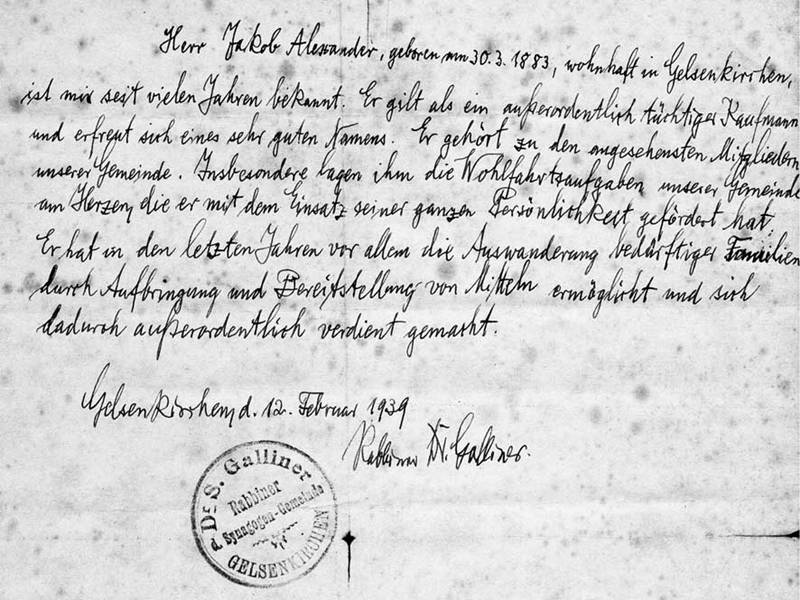
Letter of reference for Jakob Alexander from Rabbi Dr. Siegfried Galliner Germany, Gelsenkirchen, February 1939
I didn’t have the opportunity to meet my uncle Werner neither my grandmother Ella. He died in his twenties, a few years after arriving in Brazil, and she died in 1958, three years before my father met my mother. On the other hand, I had the pleasure to know my grandfather Jakob, a very lovely person. In 1962, after more than twenty years of living here, my father married my mother Maria Perpétua Saramella, Brazilian and Catholic, now 89 years old. Therefore, my brother Werner and I were born from this mix of different religions and homelands. Werner, who has Down Syndrome, received the name of our uncle.
It was only in 2005, more than ten years after my father’s death, that I discovered the memoirs of my Great Uncle Alex amongst my father’s belongings. In his memoirs, he spoke of difficult times, pain and somber separations. However, he also described the pleasure that he got from honest work, the unity of the family, and the opportunities for new begginings. I was deeply touched by his words. Ever since reading the memoirs of Uncle Alex, I’ve been studying the history of the family as well as I’ve been reconnecting with my father’s first-degree cousins. They all were born in Essen-Gelsenkirchen between 1921 and 1930, after the twins’ birth. The only Hans’s son also lives here in Rio de Janeiro city, but the majority of the family is living abroad. I hope I’ve managed to do a brief overview of the Alexander family history.
|
Quelle: Deborah Alexander, alle Rechte vorbehalten.
Abbildungen: Fotos und Dokumente, soweit nicht anders angegeben, aus Privatbesitz der Familie Alexander, mit freundlicher Genehmigung von Deborah Alexander.

Wandreklame: Spuren einer jüdischen Familie
Bei dem Abriss eines Hauses an der Bochumer Straße in Gelsenkirchen kam jüngst am Giebel des Nach- barhauses eine alte Werbebeschriftung ans Licht. Dem potentiellen Kunden werden 'Gutsitzende Anzüge & Überzieher angeboten, zu kaufen bei Alexander an der Gelsenkirchener Bahnhofstraße 83. Baujahr des Abrisshauses und Typografie lassen auf eine Anbringung der Werbeschrift um ca. 1910 schließen. Es handelt es sich dabei um die Werbung der jüdischen Brüder Alexander, die sich um diese Zeit aus Werther kommend in Gelsenkirchen niederließen und hier ihre geschäftlichen Aktivitäten aufnahmen. Für die Familie Alexander verlegen wir in Gelsenkirchen → Stolpersteine, die kleinen Denkmale für die Familie des Dermatologen Dr. Hugo Alexander werden den Anfang machen. Sein heute in New York lebender Sohn Fred hat bereits sein Einverständnis erklärt, es können Stolperstein-Patenschaften übernommen werden.
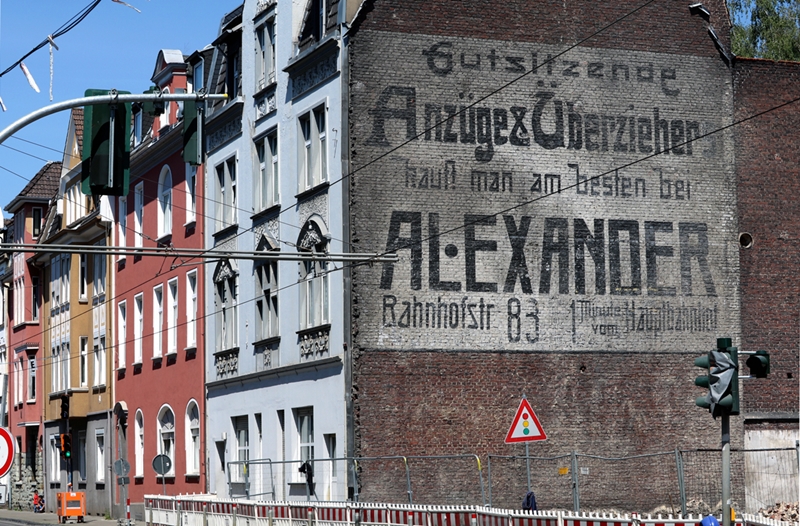
Abb.: Mehr als hundert Jahre alt ist die im Mai 2020 bei Abrissarbeiten an einem Haus in Gelsenkirchen entdeckte Wandre- klame der Firma Alexander

Ausplünderung des Besitzes von Friedrich und Jakob Alexander
In den Jahren 1938 und 1939 nahm die Bereicherung an jüdischem Eigentum die Züge eines regelrechten Wettlaufs an. Auch die Brüder Jakob und Friedrich Alexander verloren 1938 durch den staatlich legitimierten Raub, im Nazi-Jargon "Arisierung" genannt, ihren gesamten Besitz.
Heinz-Jürgen Priamus (Hg.): Was die Nationalsozialisten "Arisierung" nannten. Wirtschaftsverbrechen in Gelsenkirchen während des "Dritten Reiches" (Schriftenreihe des Instituts für Stadtgeschichte, Beiträge Bd. 13), Essen 2007. Darin Carsten Kaiser / Thomas Lamsfuss: Enteignung und Bereicherung - Zehn Beispiele, hier: Friederich und Jakob Alexander, Seite 92-99. → Dokumentation (PDF-Datei)

|